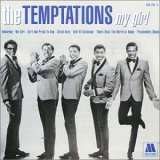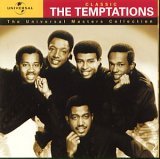|
Biography on the Temptations -
|
The history of the Temptations started in Detroit, as did that of many Motown singers. So what made one vocal quintet, the Distants, stand out? Three reasons: Elbridge Bryant, Otis Williams, and Melvin Franklin. Two supple tenors and a deep, deep bass, preserved on their 1959 single, "Come On."
Actually, they "stood out" in part because their other two colleagues had bolted!
But some Prime candidates from Alabama had shown up in Detroit and onstage before Otis Williams's eyes. When the Primes disbanded, baritone Paul Williams (no relation) and high tenor Eddie Kendricks joined the remaining Distants.
Thus, in 1961, the Elgins were born.
Oops! The president of that local upstart, Motown Records, didn't care for that name when he signed them.
So they headed back to the Hitsville building as the Temptations, and didn't leave for 16 years.
A Motown-centric biography on the Temptations would start pretty glumly. Success eluded the group at first. Working at Motown was a "Dream Come True," but even that song didn't bring lasting fame.
In 1963, a violent scuffle between Elbridge Bryant and Paul Williams preceded "Al's" exit. Another hurdle, or an opportunity?
 |
The Temptations, with David Ruffin and new tunes by Smokey Robinson, found their fortunes swinging upward. The Kendricks-led song, "The Way You Do the Things You Do," broke pop's Top 20. With "My Girl," 1964 became their year. Meanwhile, Ruffin switched off with Kendricks as the lead among a pack of strong voices.
Norman Whitfield, a rival producer, offered brawnier hits than Robinson's, like "Ain't Too Proud to Beg" and "I Wish It Would Rain." By the late '60s, his collaborations with Eddie Holland, then Barrett Strong, had earned him exclusive control over the music of the Temptations.
The group developed its own recognizable style. The Temptations wardrobe ran the fashion gamut: tuxedoes, capes, leather, linen, blues, limes, you name it. But the Tempts always looked sharp and fun in their costumes. Eddie Kendricks held some sway over this easy sophistication.
Under the direction of Broadway hoofer Cholly Atkins, the Temptations became renowned dancers, as well. Daily two-hour rehearsals ensured their movements were precise and spectacular enough to rivet fans from bare stages. Paul Williams's choreography, including the twirly Temptation Walk, oozed sheer erotic energy.
Onstage, group harmony ruled. Offstage, conflicts abounded, particularly between Ruffin and the others. Too much ego and flakiness cost him his membership in 1968. Though he released his own smash, "My Whole World Ended," solo superstardom was not meant to be.
 |
1971 brought both returns and departures. Enter "Just My Imagination," a throwback to their tender ballads. Exit Eddie Kendricks for a solo career and the disco-esque hits, "Keep on Truckin'" and "Boogie Down." Exit Paul Williams, wracked by illness and alcoholism.
Williams would have no encore. On August 17, 1973, the soulful center of the Temptations died. A few blocks from Hitsville. Of a gunshot wound. To the head. A suicide.
Two new tenors, Richard Street (formerly of the Monitors) and Damon Harris gamely met the challenge of filling Kendricks's and Williams's shoes.
 |
Things kept shifting for the Tempts. From Harris to Glenn Leonard in 1975. From Dennis Edwards to Louis Price...to Dennis Edwards (who'd leave and come back several times). And most significantly, from Motown to Atlantic in 1977, then back to Motown in the early '80s.
Just in time for a reunion tour with David Ruffin and Eddie Kendricks!
Individual resentments did mar the backstage atmosphere. But each man's bond to "the Temptations" persisted. Ruffin, Kendricks, and Edwards even embarked on a late '80s "Tribute to the Temptations" tour while the official group marched on.This biography on the Temptations now faces the inevitable.
Al Bryant, who'd left too soon to bask in glory, had followed Paul Williams to the grave in 1978, a cirrhosis victim.
Over a decade later, on June 1, 1991, 50-year-old David Ruffin passed away from a drug overdose.
 |
After a brain seizure and nearly weeklong coma, Melvin Franklin (born David English) died on February 23, 1995.
But before that...immortality.
In 1989, in flesh and in spirit, the six classic members had shared the stage once more at the Rock and Roll Hall of Fame. Smooth spokesman Otis Williams...beloved Batman fanatic Melvin Franklin...the late, limber Paul Williams...ethereally elegant Eddie Kendricks...dynamic David Ruffin...and hard-hitting Dennis Edwards.
Ah, the Temptations. Adored in their time, enshrined for the ages.
More Tempting Treats
Click Play below for vocals that are really out of sight (or sound)!
To understand the members better as unique people, not just performers, the biographical TV miniseries, The Temptations, and the book on which it's based should help.
For more content like this biography on the Temptations, see the homepage for my other Motown oldies artists!